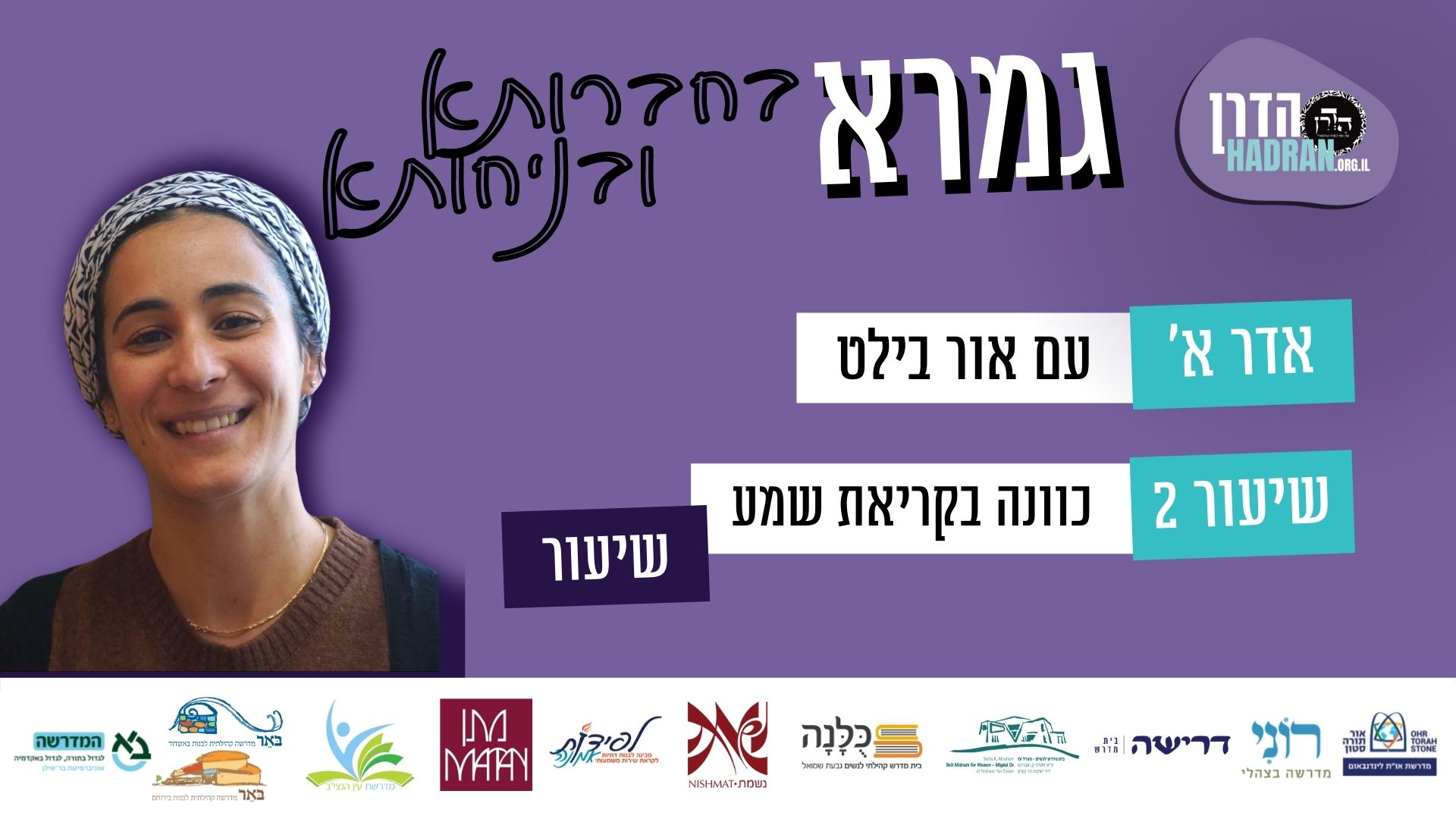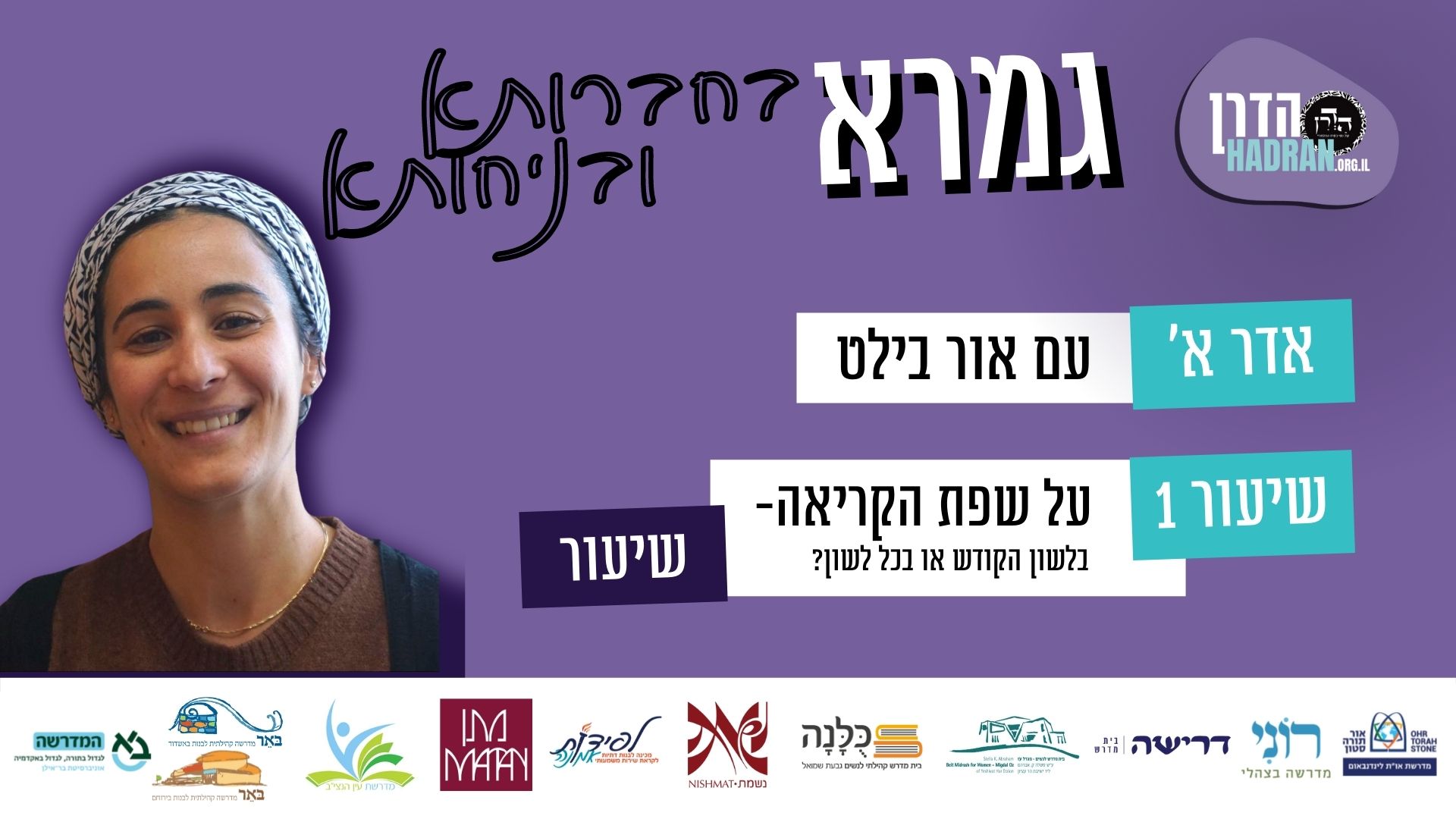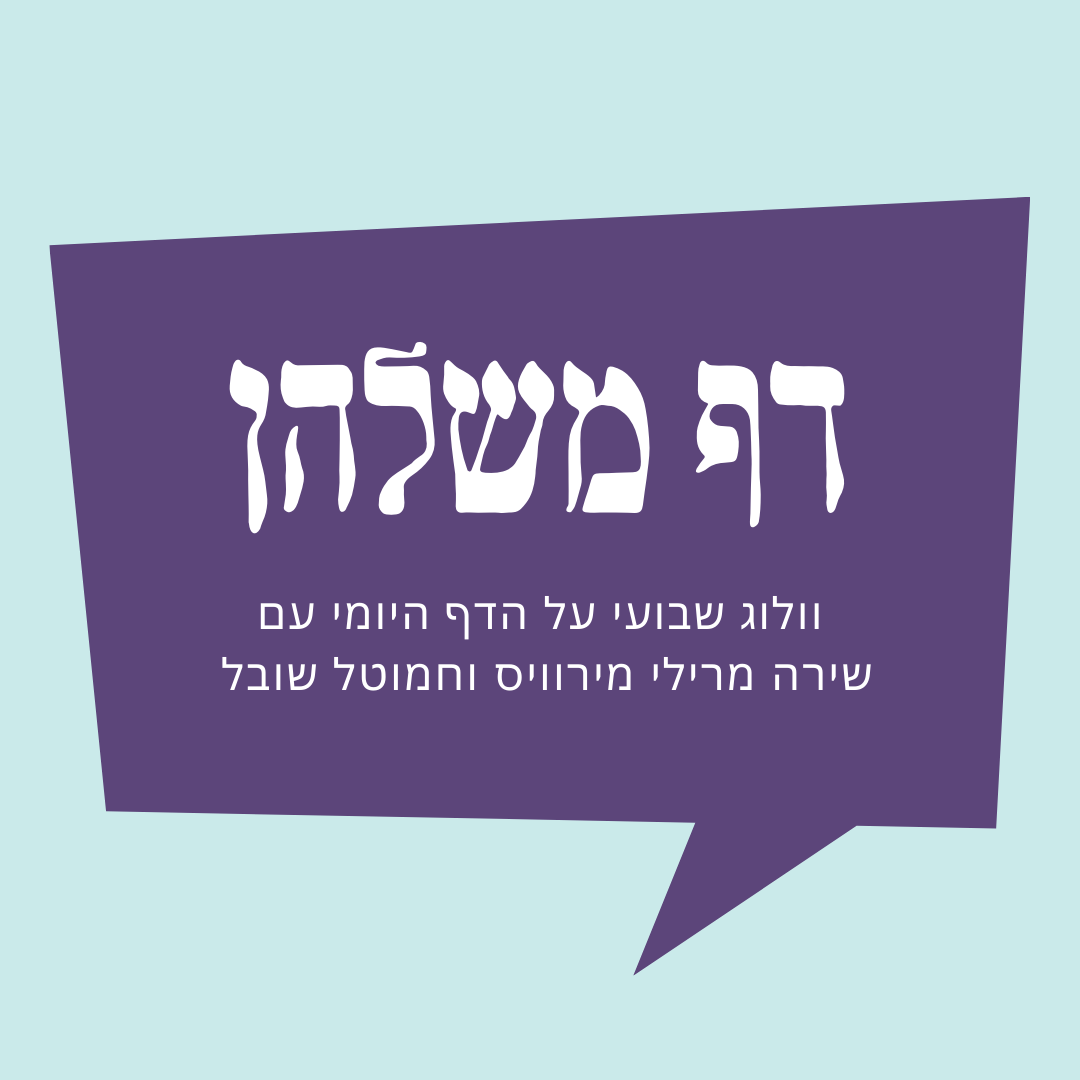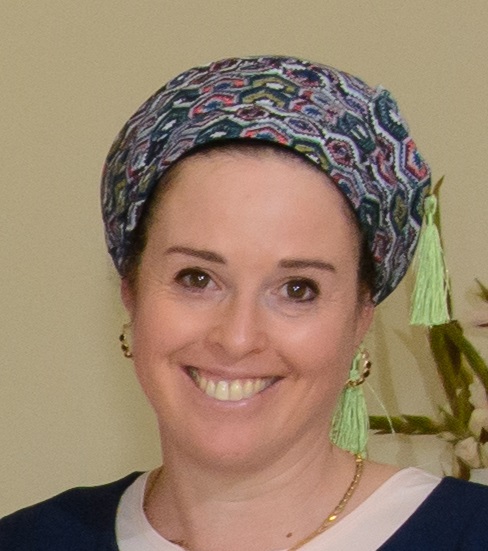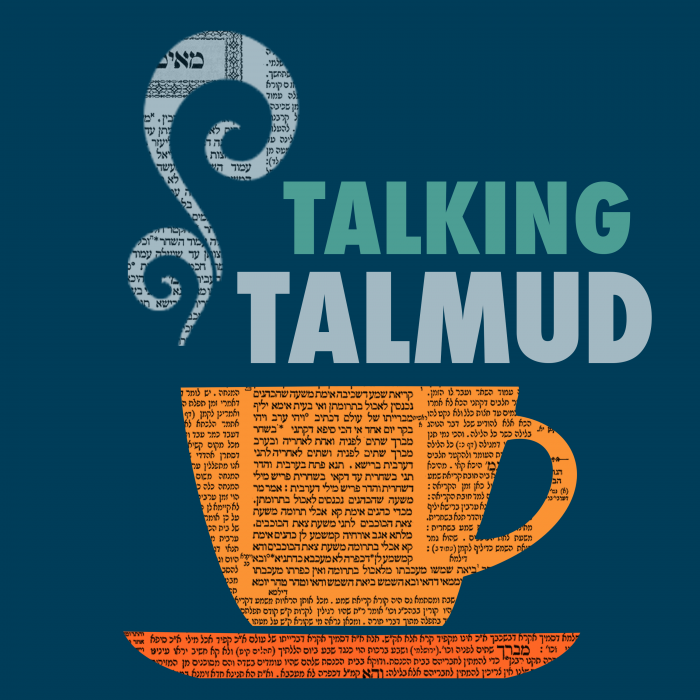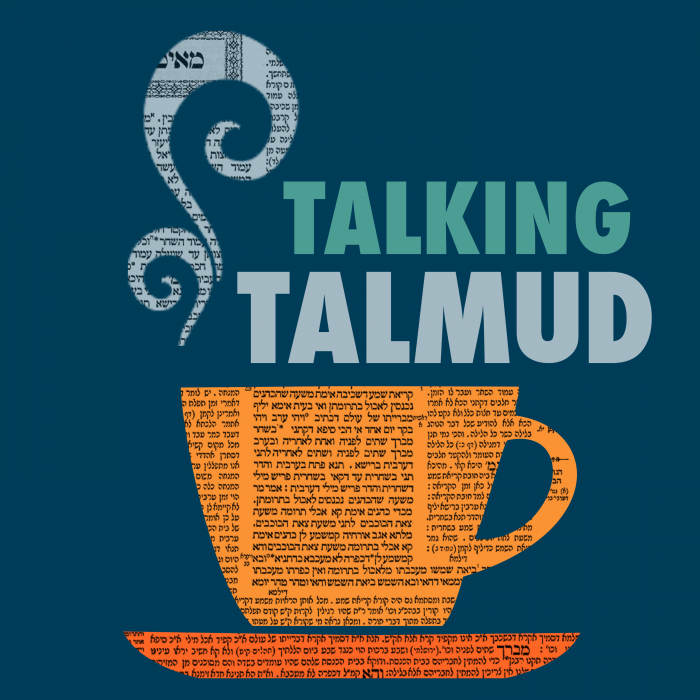האם השאלה מה מברכים על שלקות היא מחלוקת תנאים? מה מברכים על לפת? במה זה תלוי? אם מכניסים קמח לתבשיל כדי לעשותו סמיך, מה מברכים? יש מחלוקת מה מברכים על פת צנומה? המחלוקת מבוססת על מחלוקת בעניין מתי חותכים ככר לחם כשמברכים עליו – תוך כדי אמרית הברכה או לאחר הברכה. אם יש ככר שלם ופרוסות לחם, על מה מברכים? באיזה נסיבות יש מחלוקת בעניין זה? האם זה קשור למחלוקת בקשר לתרומה – האם עדיף לתת לכהן בצל קטן או חצי בצל גדול? בליל פסח כמה מצות יש והאם הם שלמים או לא? למה? דין לחם משנה בשבת – כמה לחם צריך לחתוך? כדאי לברך על לחם של העירוב כדי לקיים בו שתי מצוות.
רוצה להקדיש שיעור?
כלים
העמקה
רוצה להבין מה באמת קורה מתחת לפני השטח של הסוגיה?
שיעורים, פודקאסטים והרחבות של מיטב המורות שלנו יפתחו לך עוד זוויות וכיווני חשיבה.
חדשה בלימוד הגמרא?
זה הדף הראשון שלך? איזו התרגשות עצומה! יש לנו בדיוק את התכנים והכלים שיעזרו לך לעשות את הצעדים הראשונים ללמידה בקצב וברמה שלך, כך תוכלי להרגיש בנוח גם בתוך הסוגיות המורכבות ומאתגרות.
פסיפס הלומדות שלנו
גלי את קהילת הלומדות שלנו, מגוון נשים, רקעים וסיפורים. כולן חלק מתנועה ומסע מרגש ועוצמתי.
ברכות לט
בָּצַר לֵיהּ שִׁיעוּרָא.
it lacks the requisite measure? The smallest quantity of food that is considered eating is the size of an olive-bulk, and an olive with its pit removed is smaller than that.
אָמַר לֵיהּ: מִי סָבְרַתְּ כְּזַיִת גָּדוֹל בָּעֵינַן? כְּזַיִת בֵּינוֹנִי בָּעֵינַן (וְהָא אִיכָּא), וְהַהוּא דְּאַיְיתוֹ לְקַמֵּיהּ דְּרַבִּי יוֹחָנָן זַיִת גָּדוֹל הֲוָה, דְּאַף עַל גַּב דְּשַׁקְלוּהָ לְגַרְעִינוּתֵיהּ פָּשׁ לֵיהּ שִׁיעוּרָא.
He said to him: Do you hold that we require a large olive as the measure of food necessary in order to recite a blessing after eating? We require a medium-sized olive and that olive was that size, as the olive that they brought before Rabbi Yoḥanan was a large olive. Even though they removed its pit, the requisite measure remained.
דִּתְנַן: זַיִת שֶׁאָמְרוּ לֹא קָטָן וְלֹא גָּדוֹל, אֶלָּא בֵּינוֹנִי — וְזֶהוּ ״אֵגוֹרִי״. וְאָמַר רַבִּי אֲבָהוּ: לֹא ״אֵגוֹרִי״ שְׁמוֹ אֶלָּא ״אִבְרוֹטִי״ שְׁמוֹ, וְאָמְרִי לַהּ ״סִמְרוֹסִי״ שְׁמוֹ. וְלָמָּה נִקְרָא שְׁמוֹ ״אֵגוֹרִי״ — שֶׁשַּׁמְנוֹ אָגוּר בְּתוֹכוֹ.
The Gemara cites a proof that the halakhic measure of an olive is not based on a large olive as we learned in a mishna: The olive of which the Sages spoke with regard to the halakhic measures is neither small nor large, but medium, and that olive is called aguri. And Rabbi Abbahu said: The name of that genus of olives is not aguri, but its name is avruti, and some say that its name is samrusi. And why, then, is it called aguri? Because its oil is accumulated [agur] inside it.
נֵימָא כְּתַנָּאֵי: דְּהָנְהוּ תְּרֵי תַּלְמִידֵי דַּהֲווֹ יָתְבִי קַמֵּיהּ דְּבַר קַפָּרָא. הֵבִיאוּ לְפָנָיו כְּרוּב וְדוֹרְמַסְקִין וּפַרְגִּיּוֹת. נָתַן בַּר קַפָּרָא רְשׁוּת לְאֶחָד מֵהֶן לְבָרֵךְ, קָפַץ וּבֵרַךְ עַל הַפַּרְגִּיּוֹת. לִגְלֵג עָלָיו חֲבֵירוֹ. כָּעַס בַּר קַפָּרָא אָמַר: לֹא עַל הַמְבָרֵךְ אֲנִי כּוֹעֵס, אֶלָּא עַל הַמְלַגְלֵג אֲנִי כּוֹעֵס. אִם חֲבֵירְךָ דּוֹמֶה כְּמִי שֶׁלֹּא טָעַם טַעַם בָּשָׂר מֵעוֹלָם, אַתָּה עַל מָה לִגְלַגְתָּ עָלָיו? חָזַר וְאָמַר: לֹא עַל הַמְלַגְלֵג אֲנִי כּוֹעֵס, אֶלָּא עַל הַמְבָרֵךְ אֲנִי כּוֹעֵס. וְאָמַר: אִם חָכְמָה אֵין כָּאן, זִקְנָה אֵין כָּאן?!
With regard to the appropriate blessing over boiled vegetables: Let us say that this dispute is parallel to a dispute between the tanna’im, as the Gemara relates: Two students were sitting before bar Kappara when cooked cabbage, cooked Damascene plums and pullets were set before him. Bar Kappara gave one of the students permission to recite a blessing. He hurried and recited a blessing over the pullets and his counterpart ridiculed him for gluttonously reciting the blessing that should have been recited later, first. Bar Kappara became angry with both of them, he said: I am not angry with the one who recited the blessing, but at the one who ridiculed him. If your counterpart is like one who never tasted the flavor of meat and was therefore partial to the pullet, and hurriedly ate it, why did you ridicule him? Bar Kappara continued and said to the second student: I am not upset at the one who ridiculed him, rather it is with the one who recited the blessing that I am angry. And he said: If there is no wisdom here, is there no elder here? If you are uncertain which blessing to recite first, couldn’t you have asked me, as I am an elder?
תָּנָא: וּשְׁנֵיהֶם לֹא הוֹצִיאוּ שְׁנָתָן.
The Gemara concludes that it was taught: And both of them did not live out his year. Due to bar Kappara’s anger they were punished, and both died within the year.
מַאי לָאו בְּהָא קָא מִיפַּלְגִי, דִּמְבָרֵךְ סָבַר שְׁלָקוֹת וּפַרְגִּיּוֹת ״שֶׁהַכֹּל נִהְיֶה בִּדְבָרוֹ״, הִלְכָּךְ חַבִּיב עֲדִיף, וּמְלַגְלֵג סָבַר שְׁלָקוֹת ״בּוֹרֵא פְּרִי הָאֲדָמָה״, פַּרְגִּיּוֹת ״שֶׁהַכֹּל נִהְיֶה בִּדְבָרוֹ״, הִלְכָּךְ פֵּירָא עֲדִיף.
The Gemara attempts to infer from this story to the topic at hand: What? Is it not that they disagreed with regard to the following? The one who recited the blessing over the pullet first held that the blessing to be recited over both boiled vegetables and pullet is: By whose word all things came to be, and, therefore, that which he prefers takes precedence and is eaten first. The one who ridiculed him held that over boiled vegetables one recites: Who creates fruit of the ground, and over pullet one recites: By whose word all things came to be, and, therefore, the fruit takes precedence, as its blessing is more specific and therefore more significant.
לָא, דְּכוּלֵּי עָלְמָא שְׁלָקוֹת וּפַרְגִּיּוֹת ״שֶׁהַכֹּל נִהְיָה בִּדְבָרוֹ״, וְהָכָא בְּהַאי סְבָרָא קָא מִיפַּלְגִי: מָר סָבַר חַבִּיב עֲדִיף, וּמָר סָבַר כְּרוּב עֲדִיף, דְּזָיֵין.
The Gemara rejects this explanation: No, everyone agrees that over boiled vegetables and pullet one recites: By whose word all things came to be, and here they argue over this: This Sage, who recited the blessing, held that the food which is preferred takes precedence and one recites a blessing over it first, and the Sage who ridiculed him held: Cabbage takes precedence, as it nourishes.
אָמַר רַבִּי זֵירָא, כִּי הֲוֵינַן בֵּי רַב הוּנָא אֲמַר לַן: הָנֵי גַּרְגְּלִידֵי דְלִפְתָּא, פַּרְמִינְהוּ פְּרִימָא רַבָּא — ״בּוֹרֵא פְּרִי הָאֲדָמָה״, פְּרִימָא זוּטָא — ״שֶׁהַכֹּל נִהְיֶה בִּדְבָרוֹ״. וְכִי אֲתָאן לְבֵי רַב יְהוּדָה אֲמַר לַן: אִידֵּי וְאִידֵּי ״בּוֹרֵא פְּרִי הָאֲדָמָה״, וְהָא דְּפַרְמִינְהוּ טְפֵי, כִּי הֵיכִי דְּנִמְתִּיק טַעְמֵיהּ.
Rabbi Zeira said: When we were in the study hall of Rav Huna he said to us: These turnip heads, if one cut them into large slices, he recites over them: Who creates fruit of the ground, because in doing so he has not significantly changed them. If he cut them into small pieces, he recites over them: By whose word all things came to be. And when we came to the study hall of Rav Yehuda he said to us: Over both these, large slices, and those, small pieces, one recites: Who creates fruit of the ground, and the fact that he cut them extensively was in order to sweeten its flavor.
אָמַר רַב אָשֵׁי, כִּי הֲוֵינַן בֵּי רַב כָּהֲנָא אֲמַר לַן: תַּבְשִׁילָא דְסִלְקָא, דְּלָא מַפְּשׁוּ בַּהּ קִמְחָא — ״בּוֹרֵא פְּרִי הָאֲדָמָה״. דְּלִפְתָּא, דְּמַפְּשׁוּ בַּהּ קִמְחָא טְפֵי — ״בּוֹרֵא מִינֵי מְזוֹנוֹת״. וַהֲדַר אָמַר: אִידֵּי וְאִידֵּי ״בּוֹרֵא פְּרִי הָאֲדָמָה״, וְהַאי דְּשָׁדֵי בַּהּ קִמְחָא טְפֵי — לְדַבּוֹקֵי בְּעָלְמָא עָבְדִי לַהּ.
On a similar note, Rav Ashi said: When we were in the study hall of Rav Kahana, he said to us: Over a cooked dish of beets to which they, typically, do not add a significant amount of flour, one recites: Who creates fruit of the ground. Over a cooked dish of turnips to which they, typically, add a more significant amount of flour, one recites: Who creates the various types of nourishment. And Rav Kahana reconsidered his previous statement and said: Over both these, beets, and those, turnips, one recites: Who creates fruit of the ground, and the fact that they threw extra flour in with the turnips, they did so merely so the components of the cooked dish would stick together. The primary ingredient in the dish remains the turnips, not the flour.
אָמַר רַב חִסְדָּא: תַּבְשִׁיל שֶׁל תְּרָדִין יָפֶה לַלֵּב, וְטוֹב לָעֵינַיִם, וְכׇל שֶׁכֵּן לִבְנֵי מֵעַיִם. אָמַר אַבָּיֵי: וְהוּא דְּיָתֵיב אַבֵּי תָפֵי וְעָבֵיד ״תּוֹךְ תּוֹךְ״.
Tangential to this mention of a turnip dish, Rav Ḥisda added, and said: A cooked dish of beets is beneficial for the heart, good for the eyes and all the more so, for the intestines. Abaye said: That is specifically when the dish sits on the stove and makes a tukh tukh sound, i.e., it boils.
אָמַר רַב פָּפָּא: פְּשִׁיטָא לִי מַיָּא דְסִלְקָא — כְּסִלְקָא, וּמַיָּא דְלִפְתָּא — כְּלִפְתָּא, וּמַיָּא דְּכוּלְּהוּ שִׁלְקֵי — כְּכוּלְּהוּ שִׁלְקֵי. בָּעֵי רַב פָּפָּא: מַיָּא דְשִׁיבְתָּא מַאי? לְמַתּוֹקֵי טַעְמָא עָבְדִי, אוֹ לְעַבּוֹרֵי זוּהֲמָא עָבְדִי לַהּ?
Rav Pappa said: It is clear to me that beet water, water in which beets were boiled, has the same status as beets, and turnip water has the same status turnips, and the water in which all boiled vegetables were boiled has the same status as all boiled vegetables. However, Rav Pappa raised a dilemma: What is the status of water in which dill was boiled? Do they use dill to sweeten the taste, or do they use it to remove residual filth? If the dill was added to flavor the food then the water in which it was boiled should be treated like water in which any other vegetable was boiled. However, if the dill was added merely to absorb the residue of the soup, then there was never any intention to flavor the dish and one should not recite a blessing over it.
תָּא שְׁמַע: הַשֶּׁבֶת מִשֶּׁנָּתְנָה טַעַם בַּקְּדֵירָה אֵין בָּהּ מִשּׁוּם תְּרוּמָה, וְאֵינָהּ מְטַמְּאָה טוּמְאַת אוֹכָלִים. שְׁמַע מִינַּהּ לְמַתּוֹקֵי טַעְמָא עָבְדִי לַהּ. שְׁמַע מִינַּהּ.
Come and hear a resolution to this dilemma from what we learned in a mishna in the tractate Okatzin: Dill, once it has already given its flavor in the pot, no longer has any value and is no longer subject to the halakhot of teruma and since it is no longer considered food, it can no longer become impure with the ritual impurity of food. Learn from this that they used dill to sweeten the taste. The Gemara concludes: Indeed, learn from this.
אָמַר רַב חִיָּיא בַּר אָשֵׁי: פַּת צְנוּמָה בִּקְעָרָה מְבָרְכִין עָלֶיהָ ״הַמּוֹצִיא״. וּפְלִיגָא דְּרַבִּי חִיָּיא, דְּאָמַר רַבִּי חִיָּיא: צָרִיךְ שֶׁתִּכְלֶה בְּרָכָה עִם הַפַּת.
Rav Ḥiyya bar Ashi said: Over dry bread that was placed in a bowl to soak, one recites: Who brings forth bread from the earth, even if there is another loaf of bread before him, as it is considered bread in every respect. This halakha disagrees with the opinion of Rabbi Ḥiyya, as Rabbi Ḥiyya said: The blessing must conclude with the beginning of the breaking of the loaf of bread. The dried bread had already been sliced and separated from the loaf.
מַתְקִיף לַהּ רָבָא: מַאי שְׁנָא צְנוּמָה דְּלָא, מִשּׁוּם דְּכִי כָּלְיָא בְּרָכָה — אַפְּרוּסָה קָא כָּלְיָא? עַל הַפַּת נָמֵי, כִּי קָא גָמְרָה — אַפְּרוּסָה גָּמְרָה!
Rava strongly objects to this assumption: What is different about dried bread, that one does not recite: Who brings forth bread from the earth, over it, because when the blessing concludes, it concludes on a slice? In a case where he recites a blessing on a loaf of bread as well, when he completes the blessing, he completes it on a slice, as one cuts the bread before the blessing.
אֶלָּא אָמַר רָבָא: מְבָרֵךְ וְאַחַר כָּךְ בּוֹצֵעַ.
Rather, Rava said: When breaking bread, one recites the blessing over the complete loaf and only afterwards, he breaks it.
נְהַרְדָּעֵי עָבְדִי כְּרַבִּי חִיָּיא וְרַבָּנַן עָבְדִי כְּרָבָא. אָמַר רָבִינָא: אָמְרָה לִי אֵם, אֲבוּךְ עָבֵיד כְּרַבִּי חִיָּיא, דְּאָמַר רַבִּי חִיָּיא: צָרִיךְ שֶׁתִּכְלֶה בְּרָכָה עִם הַפַּת. וְרַבָּנַן עָבְדִי כְּרָבָא. וְהִלְכְתָא כְּרָבָא, דְּאָמַר מְבָרֵךְ וְאַחַר כָּךְ בּוֹצֵעַ.
The Gemara relates: The Sages of Neharde’a acted in accordance with the opinion of Rabbi Ḥiyya and would recite the blessing as they were breaking the bread and conclude the blessing as he finished breaking off the piece of bread. And the Rabbis acted in accordance with the opinion of Rava and would recite the blessing before breaking the bread. Ravina said: My mother told me: Your father acted in accordance with the opinion of Rabbi Ḥiyya, as Rabbi Ḥiyya said: The blessing must conclude with the beginning of the breaking of the loaf of bread. And the Rabbis acted in accordance with the opinion of Rava. The Gemara concludes: The halakha is in accordance with the opinion of Rava, who said one recites the blessing over the complete loaf and only afterwards he breaks it.
אִיתְּמַר: הֵבִיאוּ לִפְנֵיהֶם פְּתִיתִין וּשְׁלֵמִין, אָמַר רַב הוּנָא: מְבָרֵךְ עַל הַפְּתִיתִין וּפוֹטֵר אֶת הַשְּׁלֵמִין. וְרַבִּי יוֹחָנָן אָמַר: שְׁלֵמָה מִצְוָה מִן הַמּוּבְחָר. אֲבָל פְּרוּסָה שֶׁל חִטִּין וּשְׁלֵמָה מִן הַשְּׂעוֹרִין, דִּבְרֵי הַכֹּל מְבָרֵךְ עַל הַפְּרוּסָה שֶׁל חִטִּין, וּפוֹטֵר אֶת הַשְּׁלֵמָה שֶׁל שְׂעוֹרִין.
It was stated that there was an amoraic dispute with regard to whether to recite the blessing over a whole loaf of bread or to recite it over a piece of bread: If they brought pieces and whole loaves of bread before those partaking of a meal, Rav Huna said: One may recite the blessing over the pieces and with that blessing exempts the whole loaves as well. Rabbi Yoḥanan said: The optimal manner in which to fulfill the mitzva is to recite the blessing over the whole loaf. However, if the piece was of wheat bread and the whole loaf was of barley bread, everyone agrees that one recites a blessing over the piece of wheat bread. Although it is a piece of bread, it is nevertheless of superior quality, and in so doing one exempts the whole loaf of barley bread.
אָמַר רַבִּי יִרְמְיָה בַּר אַבָּא כְּתַנָּאֵי: תּוֹרְמִין בָּצָל קָטָן שָׁלֵם, אֲבָל לֹא חֲצִי בָּצָל גָּדוֹל. רַבִּי יְהוּדָה אוֹמֵר: לֹא כִי, אֶלָּא חֲצִי בָּצָל גָּדוֹל. מַאי לָאו בְּהָא קָמִיפַּלְגִי, דְּמָר סָבַר חָשׁוּב עָדִיף, וּמָר סָבַר שָׁלֵם עָדִיף.
Rabbi Yirmeya bar Abba said that the dispute between Rav Huna and Rabbi Yoḥanan is parallel to a tannaitic dispute with regard to the halakhot of teruma. We learned: Even though the onions from which the teruma must be separated are divided equally between the two, one separates teruma from a whole small onion but not from half of a large onion. Rabbi Yehuda says: No, rather, he separates teruma from half of a large onion. What, is it not that they disagree over this point, that one Sage, Rabbi Yehuda, held that the more significant takes precedence; therefore half of a large onion which is of superior quality is preferable, and the first tanna held that the whole item takes precedence?
הֵיכָא דְּאִיכָּא כֹּהֵן, כּוּלֵּי עָלְמָא לָא פְּלִיגִי דְּחָשׁוּב עָדִיף. כִּי פְּלִיגִי דְּלֵיכָּא כֹּהֵן. דִּתְנַן: כׇּל מָקוֹם שֶׁיֵּשׁ כֹּהֵן — תּוֹרֵם מִן הַיָּפֶה, וְכׇל מָקוֹם שֶׁאֵין כֹּהֵן — תּוֹרֵם מִן הַמִּתְקַיֵּים. רַבִּי יְהוּדָה אוֹמֵר: אֵין תּוֹרֵם אֶלָּא מִן הַיָּפֶה.
The Gemara rejects this comparison: Where there is a priest who can immediately take the teruma from him, everyone agrees that more significant takes precedence. When they disagree is in a case where there is no priest there, as we learned in a mishna: Everywhere that there is a priest, one separates teruma from the best, and whenever there is no priest, one separates teruma from that which will endure, so that when a priest ultimately receives it, he will be able to derive benefit from it. Rabbi Yehuda says: One always separates teruma only from the best, even though it is not the longest-lasting.
אָמַר רַב נַחְמָן בַּר יִצְחָק: וִירֵא שָׁמַיִם יוֹצֵא יְדֵי שְׁנֵיהֶן, וּמַנּוּ? — מָר בְּרֵיהּ דְּרָבִינָא, דְּמָר בְּרֵיהּ דְּרָבִינָא מַנִּיחַ פְּרוּסָה בְּתוֹךְ הַשְּׁלֵמָה וּבוֹצֵעַ.
With regard to the dispute between Rabbi Yoḥanan and Rav Huna, Rav Naḥman bar Yitzḥak said: A God-fearing individual fulfills both. And who is this God-fearing person? Mar, son of Ravina, as the Gemara relates that Mar, son of Ravina, would place the piece inside the whole loaf and break them together.
תָּנֵי תַּנָּא קַמֵּיהּ דְּרַב נַחְמָן בַּר יִצְחָק: מַנִּיחַ הַפְּרוּסָה בְּתוֹךְ הַשְּׁלֵמָה וּבוֹצֵעַ וּמְבָרֵךְ. אֲמַר לֵיהּ: מַה שִּׁמְךָ? אֲמַר לֵיהּ: שַׁלְמָן. אֲמַר לֵיהּ: שָׁלוֹם אַתָּה וּשְׁלֵמָה מִשְׁנָתְךָ, שֶׁשַּׂמְתָּ שָׁלוֹם בֵּין הַתַּלְמִידִים.
Similarly, the Gemara relates that the tanna recited a baraita before Rav Naḥman bar Yitzḥak: One places the piece inside the whole loaf, then breaks the bread and recites a blessing. Rav Naḥman said to him: What is your name? He answered: Shalman. Rav Naḥman replied with a pun: You are peace [shalom] and the teaching that you recited is complete [shelema] as by means of this baraita the disputing opinions are reconciled and you established peace among students.
אָמַר רַב פָּפָּא: הַכֹּל מוֹדִים בְּפֶסַח, שֶׁמַּנִּיחַ פְּרוּסָה בְּתוֹךְ שְׁלֵמָה וּבוֹצֵעַ. מַאי טַעְמָא? — ״לֶחֶם עֹנִי״ כְּתִיב.
This resolution is reinforced in a unique case, as Rav Pappa said: Everyone agrees that while fulfilling the mitzva of eating matza on Passover, one places the piece inside the whole and breaks. What is the reason? With regard to matza the phrase “Bread of affliction” (Deuteronomy 16:3) is written, and the poor typically eat their bread in pieces. Therefore, eating matza on Passover evening, the broken matza is also significant.
אָמַר רַבִּי אַבָּא וּבְשַׁבָּת חַיָּיב אָדָם לִבְצוֹעַ עַל שְׁתֵּי כִכָּרוֹת. מַאי טַעְמָא? — ״לֶחֶם מִשְׁנֶה״ כְּתִיב.
In connection to the various halakhot with regard to breaking bread, especially on Festivals, the Gemara cites another halakha. Rabbi Abba said: And on Shabbat one is obligated to break bread for the meal over two loaves. What is the reason? Because in the Torah portion that discusses gathering manna on Friday for Shabbat, the phrase: “Twice as much bread” (Exodus 16:22) is written. To commemorate this, Shabbat meals are based on two loaves of bread.
אָמַר רַב אָשֵׁי: חֲזֵינָא לֵיהּ לְרַב כָּהֲנָא דְּנָקֵיט תַּרְתֵּי וּבָצַע חֲדָא. רַבִּי זֵירָא הֲוָה בָּצַע אַכּוֹלָּא שֵׁירוּתָא. אֲמַר לֵיהּ רָבִינָא לְרַב אָשֵׁי: וְהָא קָא מִתְחֲזֵי כְּרַעַבְתָנוּתָא. אֲמַר [לֵיהּ]: כֵּיוָן דְּכָל יוֹמָא לָא קָעָבֵיד הָכִי, וְהָאִידָּנָא קָא עָבֵיד — לָא מִתְחֲזֵי כְּרַעַבְתָנוּתָא.
With regard to the manner in which these two loaves are to be broken, Rav Ashi said: I saw Rav Kahana who would take two loaves and break one. Rabbi Zeira would break off one large piece from the loaf, and eat from it for the entire Shabbat meal. Ravina said to Rav Ashi about this: Doesn’t it appear gluttonous for one to break off so large a piece? Rav Ashi said to him: Since every other day he does not do so, and today he does, it does not appear gluttonous, but rather in deference to the mitzva of the Shabbat meals.
רַב אַמֵּי וְרַב אַסִּי כִּי הֲוָה מִתְרְמֵי לְהוּ רִיפְתָּא דְעֵרוּבָא מְבָרְכִין עֲלֵיהּ ״הַמּוֹצִיא לֶחֶם מִן הָאָרֶץ״. אָמְרִי: הוֹאִיל וְאִתְעֲבִיד בֵּיהּ מִצְוָה חֲדָא, נַעֲבֵיד בֵּיהּ מִצְוָה אַחֲרִיתִי.
With regard to eating on Shabbat, the Gemara relates: Rav Ami and Rav Asi, when the opportunity to use the bread of the eiruv in the Shabbat meal would present itself, they would recite: Who brings forth bread from the earth over it. They said in explanation: Since one mitzva was performed with it, we will perform another mitzva with it.


